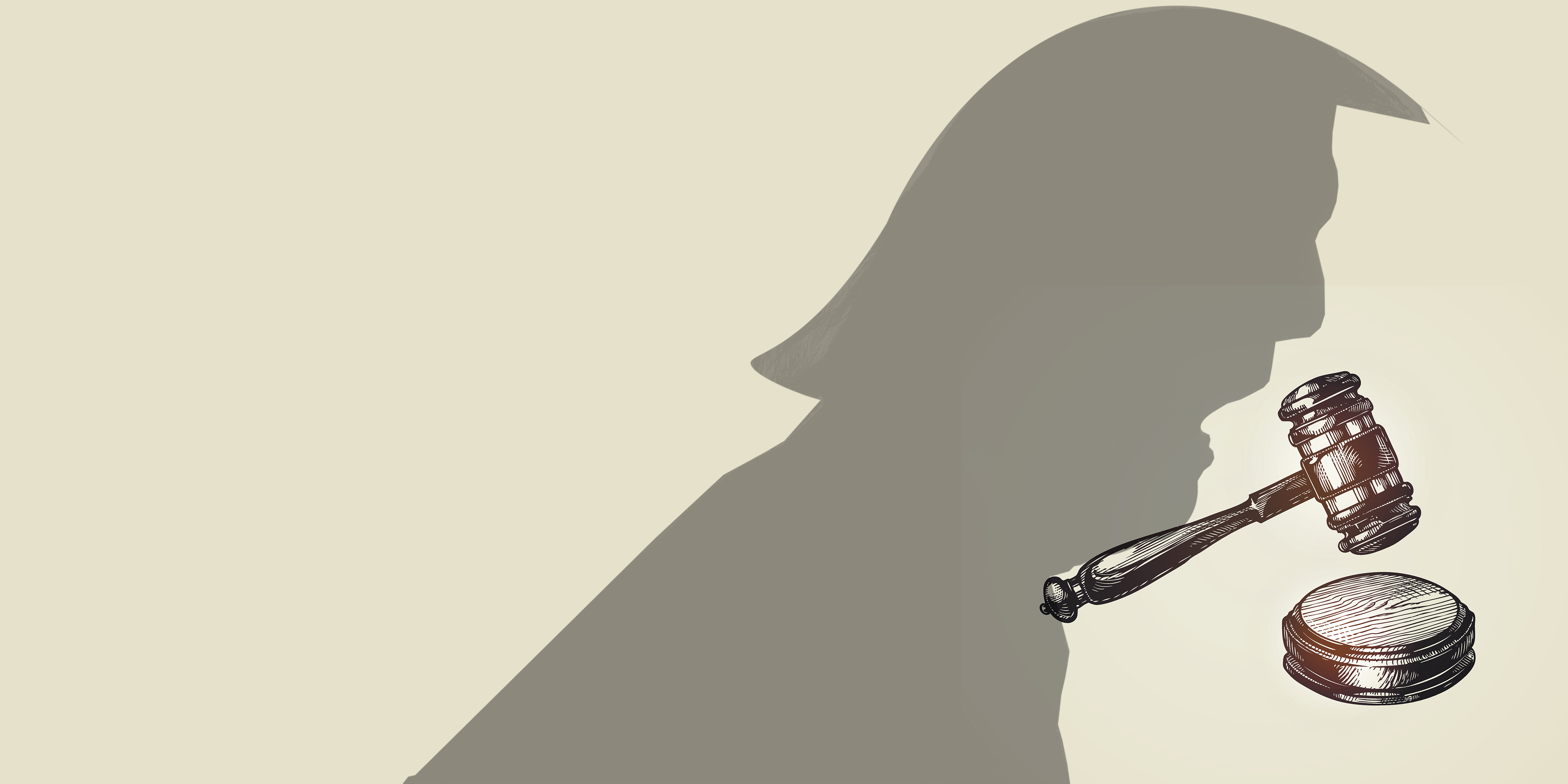How Trump wields unprecedented control over America's judiciary
By announcing lists of candidates for high court appointments, Trump influences the behavior of sitting federal judges


A free daily email with the biggest news stories of the day – and the best features from TheWeek.com
You are now subscribed
Your newsletter sign-up was successful
In less than a year, President Trump has made enough appointments to the federal courts to "reshape the judiciary." That is not an overstatement. Thanks to Republican obstruction during the last two years of Barack Obama's presidency, an unusually large number of openings on the courts greeted Trump, including the Supreme Court seat now occupied by Justice Neil Gorsuch.
But aside from the obvious impact that a large number of Trump appointees will have on the judiciary, there is another way in which the president is breaking with precedent to influence judicial decision-making. Recent research in political science demonstrates that by explicitly naming judges as potential future Supreme Court nominees, Trump increases the likelihood of judges attempting to pander to his preferences in their behavior from the bench.
That's what Ryan Black and Ryan Owens, professors of political science at Michigan State and Wisconsin, respectively, found in their paper, "Courting the President: How Circuit Court Judges Alter their Behavior for Promotion to the Supreme Court." Simply put, judges have career ambition, like anyone else. So, when vacancies appear higher up the chain — the federal Court of Appeals or the Supreme Court, for example — judges who are believed to be candidates for promotion try to make themselves more appealing to presidents. They become more likely to vote with the president's preferences, to rule in favor of the United States, and to write dissenting opinions.
The Week
Escape your echo chamber. Get the facts behind the news, plus analysis from multiple perspectives.

Sign up for The Week's Free Newsletters
From our morning news briefing to a weekly Good News Newsletter, get the best of The Week delivered directly to your inbox.
From our morning news briefing to a weekly Good News Newsletter, get the best of The Week delivered directly to your inbox.
This should not be surprising. Judges are human, and we all can empathize with altering our behavior at work when we know we are being watched closely and if the potential for promotion to a great new job is hovering over us. The workplace gives us all an incentive to try to give our superiors what we think they want. And Black and Owens reached this conclusion in 2015, when the idea of "President Trump" was still likely to elicit laughter. So why pay attention to the findings now?
For one, Trump has broken with all norms by explicitly releasing lists with names of potential judicial nominees — an official list of contenders, so to speak. "Previous presidents have hinted at the names of certain people they might consider as justices or cabinet members, but forwarding a list, or series of lists, as President (and then-candidate) Trump has done is unique," says Black. During the 2016 campaign this was a politically savvy move by Trump, who saw naming specific judges as a means of reassuring Republicans and conservatives that he was one of them and not a closet liberal.
But since Inauguration Day, the list-making and public comments on future nominees has continued. And it gives a number of judges who currently hold influential positions a strong incentive to give the president what they think he will like. Writing more dissenting opinions, for example, is one way that judges show off their beliefs and ideology. Dissents do not carry the same weight as majority opinions, but they offer a judge a chance to "write precisely what she wants, without need to compromise," Black and Owens point out.
Another consideration Black and Owens emphasize is the need for judges to prepare themselves for future confirmation hearings before the Senate. In an era in which, the authors say, "every word published, and then some, will receive extreme scrutiny by the Senate Judiciary Committee," written opinions are a good way for judges who see themselves as candidates for promotion to put their views on the record in an attempt to control that narrative.
A free daily email with the biggest news stories of the day – and the best features from TheWeek.com
There is, of course, an excellent chance that Trump does not realize the effect his list-making may have on judges. He does not strike anyone as a person who keeps abreast of research in political science journals. However, the effects of his reality TV style preference for turning appointments into a public competition — he had to be talked out of inviting three judges to the White House and then naming one of them to the Supreme Court, a la The Apprentice, in February — are nonetheless real.
I asked Black and Owens to put Trump's views on the appointment process in context, and they emphasized that not everything he is doing is unprecedented. "Short lists" of potential appointees and nominees have always circulated through leaks and whispers on the D.C. cocktail party circuit. What is a dramatic shift is Trump's willingness to engage in the decision-making process over appointments publicly — naming his potential picks in, perhaps, an effort to add some showbiz drama to what is otherwise an extremely important but not terribly exciting part of governing.
Whether through luck or innate political savviness, the new approach to appointments is paying off. Black and Owens point out that, "for many conservatives and Republicans, President Trump's biggest success has been his judicial appointments." Those folks are in luck, as Trump has a lot of appointments to fill. He is not shy about revealing which judges he is keeping an eye on. That ensures that the men and women in the spotlight, even if they end up being passed over, are behaving on the bench in a way that is intended to appeal to an audience of one: President Trump.
Ed Burmila is an Assistant Professor of Political Science at Bradley University. He lives in Chicago and blogs politics at Gin and Tacos.
-
 The Olympic timekeepers keeping the Games on track
The Olympic timekeepers keeping the Games on trackUnder the Radar Swiss watchmaking giant Omega has been at the finish line of every Olympic Games for nearly 100 years
-
 Will increasing tensions with Iran boil over into war?
Will increasing tensions with Iran boil over into war?Today’s Big Question President Donald Trump has recently been threatening the country
-
 Corruption: The spy sheikh and the president
Corruption: The spy sheikh and the presidentFeature Trump is at the center of another scandal
-
 The billionaires’ wealth tax: a catastrophe for California?
The billionaires’ wealth tax: a catastrophe for California?Talking Point Peter Thiel and Larry Page preparing to change state residency
-
 Bari Weiss’ ‘60 Minutes’ scandal is about more than one report
Bari Weiss’ ‘60 Minutes’ scandal is about more than one reportIN THE SPOTLIGHT By blocking an approved segment on a controversial prison holding US deportees in El Salvador, the editor-in-chief of CBS News has become the main story
-
 Has Zohran Mamdani shown the Democrats how to win again?
Has Zohran Mamdani shown the Democrats how to win again?Today’s Big Question New York City mayoral election touted as victory for left-wing populists but moderate centrist wins elsewhere present more complex path for Democratic Party
-
 Millions turn out for anti-Trump ‘No Kings’ rallies
Millions turn out for anti-Trump ‘No Kings’ ralliesSpeed Read An estimated 7 million people participated, 2 million more than at the first ‘No Kings’ protest in June
-
 Ghislaine Maxwell: angling for a Trump pardon
Ghislaine Maxwell: angling for a Trump pardonTalking Point Convicted sex trafficker's testimony could shed new light on president's links to Jeffrey Epstein
-
 The last words and final moments of 40 presidents
The last words and final moments of 40 presidentsThe Explainer Some are eloquent quotes worthy of the holders of the highest office in the nation, and others... aren't
-
 The JFK files: the truth at last?
The JFK files: the truth at last?In The Spotlight More than 64,000 previously classified documents relating the 1963 assassination of John F. Kennedy have been released by the Trump administration
-
 'Seriously, not literally': how should the world take Donald Trump?
'Seriously, not literally': how should the world take Donald Trump?Today's big question White House rhetoric and reality look likely to become increasingly blurred
